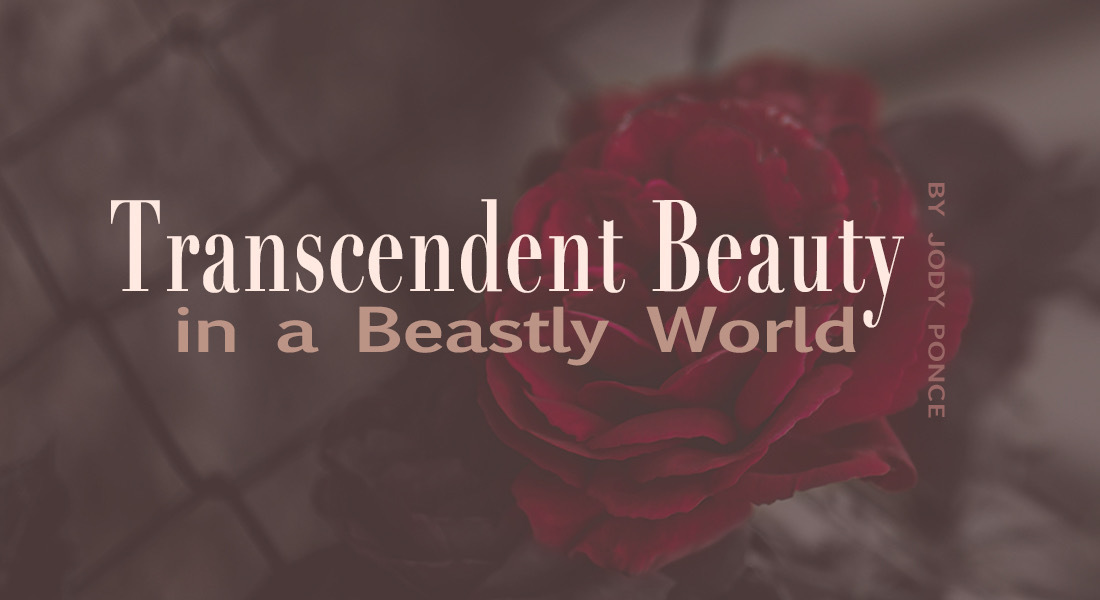
In the movie Beauty and the Beast, we see how looking beyond an outward beastly appearance to the beauty within can be a positively transformative experience. Beauty is heralded and powerful. The poet John Keats said, “Beauty is truth, truth beauty—that is all.” If beauty is truth, then all the base and ugly things in our existence are coverings, clothing which conceals the true beauty and value of people created in the image of God, much like the curse placed on the Beast in the movie.
If beauty is truth, why then are we, as an advanced, progressive western society so consumed by analyzing and dissecting and examining all that is base and beastly in this world with an insatiable, consumptive appetite?
“We don’t,” you might say.
Oh, but we do. Our entertainment is so often based on the themes of violence, cruelty, betrayal and inhumanity, or, when we consider reality TV, simply the most base forms of unthoughtful humanity. Shows like The Bachelor or The Kardashians do not promote the high order thinking or the transcendent values humans are capable of. They utilize low forms of gossip, ridicule or scandal to appeal on the most base level.
No thought of human value or purpose is attributed to either the figures on-screen or those watching from their couch.
When we consider the Christian worldview and the value placed in people as created beings and as expressed in the death of Jesus Christ for humanity, then the time we spend in our day to day lives, dwelling on the base and brutal aspects of this world, is an indictment on our claim to be image-bearers of God.
The world we live in is riddled with anxiety and depression. I myself battle anxiety. But I wonder if these struggles are exasperated by our cultural fixation with the darkness we see around us. The darkness is real and pervasive, but why do we let it pervade us so much more than we need to, particularly through popular entertainment? If fear is a battle for you in your life, why dwell so much on fear?
There is a better suggestion. Paul states in Philippians, “Finally, brothers, whatever is true, whatever is honorable, whatever is just, whatever is pure, whatever is lovely, whatever is commendable, if there is any excellence, if there is anything worthy of praise, think about these things.”
Think about these things.
How much of popular culture is created around truth and excellence?
Rather, it largely feeds on broken humanity, scandal and all that is base about our world. Let me encourage you to reject cynicism and callousness when considering people. We don’t have to be hard-boiled toward and suspicious of others. The second part of Romans 16:19 says, “Be wise as to what is good and innocent as to what is evil.” Which are we more adept in recognizing? What do we spend more time contemplating or being entertained by? Good or evil?
I had a sociology lecturer back when I was in university. He was a sociological genius and the head of the sociology department at University College Cork. I will never forget what he said in a lecture one day when discussing society’s obsession with mindless reality TV. He said, “When you take something and bring it down to zero, and then multiply it, you get an infinity of zero, an infinity of mindless, worthless totality, unprofitable rubbish.” He was so right. Human persons are capable of so much beauty. We are, after all, created in the image of God. But how will we ever reflect the beauty, goodness and kindness of God, His excellence, purity, honor, commendation or truth when we are not looking at beauty, particularly God’s beauty, and His reflected beauty in creation and humanity? Instead, with blinders on, we stare abjectly at the “Beast:” the cruelty, violence and depravity of the world.
“But these things (cruelty, depravity and violence, etc.) exist,” I hear you say. “Should they not be given our consideration?” Yes, of course, they must. As Christians, we are mandated to combat these forces with the love of God for humanity, but this is a very different form of consideration than hungrily being entertained by these themes.
Paul also says in Philippians chapter four, verses 4-7: “Rejoice in the Lord always; again I will say, rejoice. Let your reasonableness be known to everyone. The Lord is at hand; do not be anxious about anything, but in everything by prayer and supplication with thanksgiving let your requests be made known to God. And the peace of God, which surpasses all understanding, will guard your hearts and your minds in Christ Jesus.”
According to Paul in these verses, how do we find peace?
I would suggest Paul is saying we find peace through dwelling on God. When we are happy, rejoice in the Lord, when we are anxious, look to the Lord for help, when we are grateful, thank God. God is purity and beauty, so look to Him and dwell on Him. Jesus said, “When you see Me, you see the Father.”
For true beauty, look to and dwell on Jesus as He is revealed to us in the Bible. Remember that humanity is made in the image and likeness of God, so do not dwell on the aspects of humanity that have become base and beastly.
Do not entertain yourself with the base things of the world, when we have been imbued by God with the capacity for so much more. Psalm 8 states humanity is “crowned with glory and honor.” Ephesians 2:10 says, “For we are His workmanship, created in Christ Jesus for good works.” We so easily forget the glory of God, of His creation and how He loves the people of this earth; this is largely due to the amount of time we spend dwelling on the corruption and darkness in the world.
Even the hard atheist Nietzsche said, “If you gaze long enough into an abyss, the abyss will gaze back into you.” If you dwell so much on darkness, the darkness eventually permeates you. So dwell instead on light; it too will permeate your being. Jesus said, “You are the light of the world.” So let us then be light (Matthew 5:14). Colossians 1:13 says, “He has delivered us from the domain of darkness and transferred us into the Kingdom of His beloved Son.”
Just ask yourself, What am I spending my time dwelling on?
Is it darkness and fear? Is it inhumanity and brokenness? Or is it the beauty and power of God? Is it His excellence and purity because whichever one of these you dwell on will affect how you view the world, society, your own life and the people around you. You will see people either as high and capable of great beauty and creativity, or as low, base and beastly, not worthy of the love and respect given to them by God.
Christopher Hitchens, the renowned atheist thinker, states, “The biggest problem facing a post-religious or superstitious world is the lack of beauty and the transcendent.” Well, this is a very good point. Without God and His glory in the universe, where can we find the transcendent? What a great loss this would be; what an empty existence. The point is that, as Christians, we believe we do live in a universe that was created by God and that displays His glory. Why then do we often live as though this was not true, as though we live in this post-God world that even Hitchens describes as being empty of the transcendent? Instead of lifting our eyes to the beauty and glory of God and allowing this to inform how we love our fellow humans, we focus our eyes away from all that is worthy, beautiful and great, and we dwell on brutality, inanity and worthlessness.
Psalm 1 says: “Blessed is the man who walks not in the counsel of the wicked, nor stands in the way of sinners, nor sits in the seat of scoffers; but his delight is in the law of the Lord, and on his law he meditates day and night. He is like a tree planted by streams of water that yields its fruit in its season, and its leaf does not wither. In all that he does, he prospers.”
This man in Psalm 1 made his choice. He dwelled on the beauty and greatness of God. He rejected the low and scoffing ways of society, and this choice affected his life. He was rooted in the reality and foundation of God.
If we believe in God, let us live like that is true. As Paul so wisely tells us, “Whatever is true, whatever is honorable, whatever is just, whatever is pure, whatever is lovely, whatever is commendable, if there is any excellence, if there is anything worthy of praise, think about these things.”
To think about the glory of God seems like a grand endeavor indeed, but Jesus said in John 14:9, “Anyone who has seen me has seen the Father.” God gave up His power and glory to become a man, if we need to consider the beauty of God, then we need look no further than Jesus. God made Himself known to us in Jesus. Jesus is kind, powerful, humble and self-sacrificing. He is our inspiration; He gives value to all humans because He loved them so much He died for them. Let us then see the people we encounter in our lives as beautiful and worthy of love, because that’s how God sees them.
So what it’s to be, Beauty or the Beast? What we think about is important, so let’s choose to dwell on Jesus, on the glory of God, rather than dwelling on the base and beastly things found in this world.






